Background
Natalie Curtis Burlin was born on April 26, 1875 in New York City, the daughter of Edward and Augusta Lawler (Stacey) Curtis and niece of George William Curtis.



(The Shelf2Life Native American Studies Collection is a un...)
The Shelf2Life Native American Studies Collection is a unique set of pre-1923 materials that explore the characteristics and customs of North American Indians. From traditional songs and dance of the Apache and Navajo to the intricate patterns of Arapaho moccasins, these titles explore the symbolic meaning of Native American music and art. Complex relationships between tribal groups and government are also examined, highlighting the historic struggle for land rights, while the retelling of ancient myths and legends emphasize a belief in the interconnection of humans and nature and provide readers with significant insight into a culture deeply rooted in spirituality. The Shelf2Life Native American Studies Collection provides an invaluable perspective into Native American culture and politics during the late 19th and early 20th centuries.
https://www.amazon.com/Indians-Book-Natalie-Curtis/dp/1117875253?SubscriptionId=AKIAJRRWTH346WSPOAFQ&tag=prabook-20&linkCode=sp1&camp=2025&creative=165953&creativeASIN=1117875253
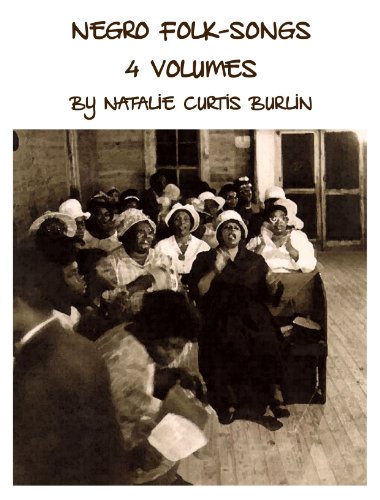
(TOC Follows Negro Folk-Songs / Spirituals and Work/Play S...)
TOC Follows Negro Folk-Songs / Spirituals and Work/Play Songs (Hampton Series) Recorded by Natalie Curtis Burlin in Four Books (Complete, Books 1-4) Student Facsimile, 2013 Ride On, Jesus Go Down, Moses Couldn't Hear Nobody Pary Good News Chariots Comin Tis Me, Lord Listen to De Lambs O, Evry Time I Feel De Spirit God's a Gwine Ter Move All De Troubles Away Cotton Pickin Song Cotton Pickin Dance Cotton Packin Song Corn Shuckin Song Peanut Pickin Song Hammerin Song Lullaby Chicka-Hanka Hyah, Rattler Old Rags, Bottles, Rags Liza Jane.UNBOUND BINDER-READY / LOOSE LEAF, BINDER-READY means that the pages are hole-punched and ready to be put in binders. PLEASE NOTE THE BINDER(S) ARE NOT INCLUDED. LOOSE LEAF UNBOUND EDITION NO BINDER.
https://www.amazon.com/Folk-Songs-Spirituals-Recorded-Complete-Facsimile/dp/B00C00IXA2?SubscriptionId=AKIAJRRWTH346WSPOAFQ&tag=prabook-20&linkCode=sp1&camp=2025&creative=165953&creativeASIN=B00C00IXA2
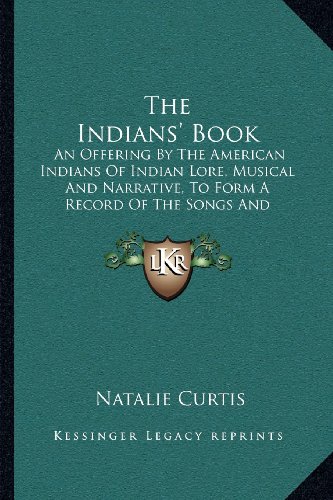
(This scarce antiquarian book is a facsimile reprint of th...)
This scarce antiquarian book is a facsimile reprint of the original. Due to its age, it may contain imperfections such as marks, notations, marginalia and flawed pages. Because we believe this work is culturally important, we have made it available as part of our commitment for protecting, preserving, and promoting the world's literature in affordable, high quality, modern editions that are true to the original work.
https://www.amazon.com/Indians-Book-Offering-American-Narrative/dp/1163956511?SubscriptionId=AKIAJRRWTH346WSPOAFQ&tag=prabook-20&linkCode=sp1&camp=2025&creative=165953&creativeASIN=1163956511

(This book was originally published prior to 1923, and rep...)
This book was originally published prior to 1923, and represents a reproduction of an important historical work, maintaining the same format as the original work. While some publishers have opted to apply OCR (optical character recognition) technology to the process, we believe this leads to sub-optimal results (frequent typographical errors, strange characters and confusing formatting) and does not adequately preserve the historical character of the original artifact. We believe this work is culturally important in its original archival form. While we strive to adequately clean and digitally enhance the original work, there are occasionally instances where imperfections such as blurred or missing pages, poor pictures or errant marks may have been introduced due to either the quality of the original work or the scanning process itself. Despite these occasional imperfections, we have brought it back into print as part of our ongoing global book preservation commitment, providing customers with access to the best possible historical reprints. We appreciate your understanding of these occasional imperfections, and sincerely hope you enjoy seeing the book in a format as close as possible to that intended by the original publisher.
https://www.amazon.com/Indians-offering-American-musical-narrative/dp/B00AU627VO?SubscriptionId=AKIAJRRWTH346WSPOAFQ&tag=prabook-20&linkCode=sp1&camp=2025&creative=165953&creativeASIN=B00AU627VO

( This work has been selected by scholars as being cultur...)
This work has been selected by scholars as being culturally important, and is part of the knowledge base of civilization as we know it. This work was reproduced from the original artifact, and remains as true to the original work as possible. Therefore, you will see the original copyright references, library stamps (as most of these works have been housed in our most important libraries around the world), and other notations in the work. This work is in the public domain in the United States of America, and possibly other nations. Within the United States, you may freely copy and distribute this work, as no entity (individual or corporate) has a copyright on the body of the work. As a reproduction of a historical artifact, this work may contain missing or blurred pages, poor pictures, errant marks, etc. Scholars believe, and we concur, that this work is important enough to be preserved, reproduced, and made generally available to the public. We appreciate your support of the preservation process, and thank you for being an important part of keeping this knowledge alive and relevant.
https://www.amazon.com/Songs-Ancient-America-Pueblo-Corn-Grinding/dp/1375420119?SubscriptionId=AKIAJRRWTH346WSPOAFQ&tag=prabook-20&linkCode=sp1&camp=2025&creative=165953&creativeASIN=1375420119
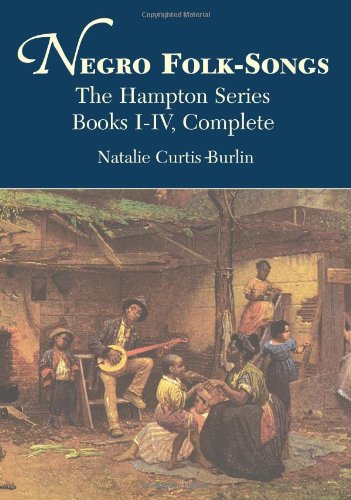
( This collection of Negro folk songs represents a faithf...)
This collection of Negro folk songs represents a faithful effort to place on paper a precise record of old traditional plantation songs, exactly as they were sung by black students at Virginia's Hampton Normal and Agricultural Institute. Dedicated to the education of former slaves, this nineteenth-century establishment was home to some 900 students from all parts of the United States. The songs were compiled by musicologist Natalie Curtis-Burlin, whose brilliant and careful notation presents a vivid transcription of actual performance. Included here are precise scores of nineteen spirituals, work-songs, and play-songs in four sections, each notated for male quartet, with a piano reduction of the vocal parts. From such spirituals as "Go down, Moses," "Couldn't hear nobody pray," "O ev-ry time I feel de spirit," and "Good news, chariot's comin'!" to more secular melodies such as "Cott'n-pickin' Song," "Hammerin' Song," "Liza-Jane," and "Lullaby," each piece is preceded by a detailed analysis of the music. In addition, all four sections feature thorough, engaging introductions that discuss the social context of the times, the people, and their music. Students, musicians, and musicologists interested in the priceless contributions of African Americans to the folk music of the United States will treasure this unique volume.
https://www.amazon.com/Negro-Folk-Songs-Hampton-Books-Complete/dp/0486418804?SubscriptionId=AKIAJRRWTH346WSPOAFQ&tag=prabook-20&linkCode=sp1&camp=2025&creative=165953&creativeASIN=0486418804

(By Hiamovi (H igh Chief) (C hief among the Cheyennes and ...)
By Hiamovi (H igh Chief) (C hief among the Cheyennes and theD akotas.) To the Great Chief at Washington, and to the Chiefs of Peoples across the Great Water This is the Indians Book Long ago the Great Mystery caused this land to be, and made the Indians to live in this land. Well has the Indian fulfilled all the intent of the Great Mystery for fiim. Through this book may men know that the Indian people was made by the Great Mystery for a purpose. Once, only Indians lived in this land. Then came strangers from across the Great Water. No land had they; we gave them of our land. No food had they; we gave them of our corn. The strangers are become many and they fill all the country. They dig gold from my mountains; they build houses of the trees of my forests; they rear cities of my stones and rocks; they make fine garments from the hides and wool of animals that eat my grass. None of the things that make their riches did they bring with them from beyond the Great Water; all comes from my land, the land the Great Mystery gave unto the I ndian. And when I think upon this I know that it is right, even thus. In the heart of the great Mystery it was meant that stranger-visitors my friends across the Great Water should come to my land; that I should bid them welcome; that all men should sit down with me and cat together of my corn. It was meant by the Great Mystery that the Indian should give to all peoples. But the white man never has known the I ndian. It is thus: there are two roads, the wliite mans road, and the Indian sroad. Neither traveller knows the road of the other. Thus ever has it been, from the long ago, even unto to-day. May tliis book help to make the Indian truly known in the time to come. The Indian wise-speakers in this book are of the best men of their tribes. Only what is true is witfiin this book. I want all Indians and white men to read and lear (Typographical errors above are due to OCR software and don't occur in the book.)
https://www.amazon.com/Indians-Book-Offering-American-Narrative/dp/B008LH1A1C?SubscriptionId=AKIAJRRWTH346WSPOAFQ&tag=prabook-20&linkCode=sp1&camp=2025&creative=165953&creativeASIN=B008LH1A1C
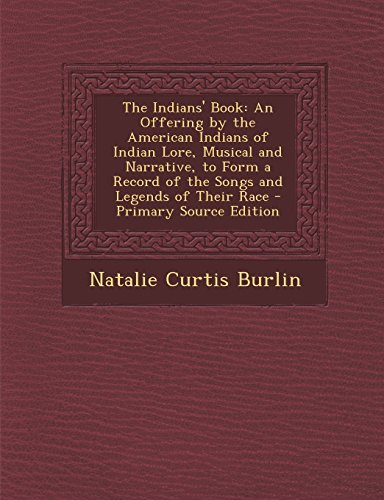
(This is a reproduction of a book published before 1923. T...)
This is a reproduction of a book published before 1923. This book may have occasional imperfections such as missing or blurred pages, poor pictures, errant marks, etc. that were either part of the original artifact, or were introduced by the scanning process. We believe this work is culturally important, and despite the imperfections, have elected to bring it back into print as part of our continuing commitment to the preservation of printed works worldwide. We appreciate your understanding of the imperfections in the preservation process, and hope you enjoy this valuable book.
https://www.amazon.com/Indians-Book-Offering-American-Narrative/dp/1293665592?SubscriptionId=AKIAJRRWTH346WSPOAFQ&tag=prabook-20&linkCode=sp1&camp=2025&creative=165953&creativeASIN=1293665592
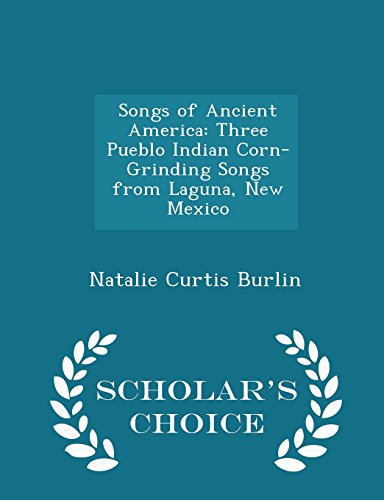
( This work has been selected by scholars as being cultur...)
This work has been selected by scholars as being culturally important, and is part of the knowledge base of civilization as we know it. This work was reproduced from the original artifact, and remains as true to the original work as possible. Therefore, you will see the original copyright references, library stamps (as most of these works have been housed in our most important libraries around the world), and other notations in the work. This work is in the public domain in the United States of America, and possibly other nations. Within the United States, you may freely copy and distribute this work, as no entity (individual or corporate) has a copyright on the body of the work. As a reproduction of a historical artifact, this work may contain missing or blurred pages, poor pictures, errant marks, etc. Scholars believe, and we concur, that this work is important enough to be preserved, reproduced, and made generally available to the public. We appreciate your support of the preservation process, and thank you for being an important part of keeping this knowledge alive and relevant.
https://www.amazon.com/Songs-Ancient-America-Corn-Grinding-Scholars/dp/1298353041?SubscriptionId=AKIAJRRWTH346WSPOAFQ&tag=prabook-20&linkCode=sp1&camp=2025&creative=165953&creativeASIN=1298353041
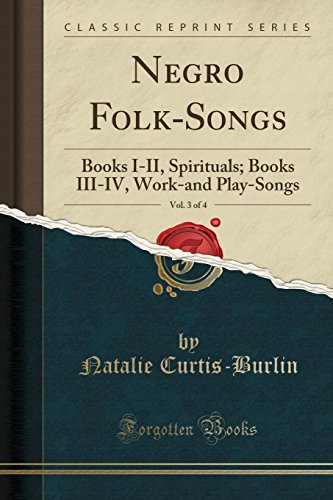
(Excerpt from Negro Folk-Songs, Vol. 3 of 4: Books I-II, S...)
Excerpt from Negro Folk-Songs, Vol. 3 of 4: Books I-II, Spirituals; Books III-IV, Work-and Play-Songs The question was eagerly put by a young German musician who was visiting the Hampton Institute in Virginia and for the first time heard the great chorus of nine hundred colored students sing the Plantations, as the Negroes call the old melodies that had their birth in days of slavery - religious songs that were the voice of the bondsman's soul. From a technical as well as purely musical standpoint the extraordinary unity, the precision in attack and the faultless pitch of the Negro singers impelled the musician's query. And my answer baffled him: Why, no one trains these Negro boys and girls, their singing is natural. About the Publisher Forgotten Books publishes hundreds of thousands of rare and classic books. Find more at www.forgottenbooks.com This book is a reproduction of an important historical work. Forgotten Books uses state-of-the-art technology to digitally reconstruct the work, preserving the original format whilst repairing imperfections present in the aged copy. In rare cases, an imperfection in the original, such as a blemish or missing page, may be replicated in our edition. We do, however, repair the vast majority of imperfections successfully; any imperfections that remain are intentionally left to preserve the state of such historical works.
https://www.amazon.com/Negro-Folk-Songs-Vol-Spirituals-Work-/dp/0282821473?SubscriptionId=AKIAJRRWTH346WSPOAFQ&tag=prabook-20&linkCode=sp1&camp=2025&creative=165953&creativeASIN=0282821473
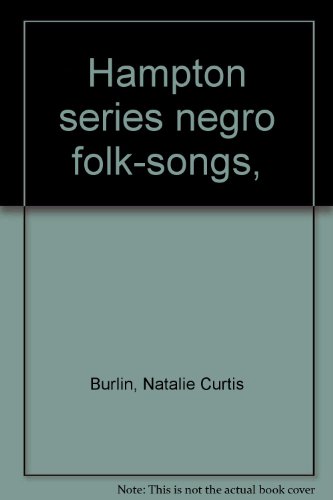
(This historic book may have numerous typos and missing te...)
This historic book may have numerous typos and missing text. Purchasers can usually download a free scanned copy of the original book (without typos) from the publisher. Not indexed. Not illustrated. 1919 edition. Excerpt: ...All four voices were peculiarly beautiful and absolutely untrained. Sensuously musical they were in timbre--mellow, full and reed-like, touched by that elemental emotional quality that makes the slave-songs, when sung by Negroes, so full of simple pathos. Yet a sunny happiness and infectious good-humor pervaded the See Pates 3, 7. 17, Book I of thia seriea. ("Lead") Agriculture, Virginia (Tenor) Tinsmith;" (Baritone) Schoolteacher;" (Bass) Bricklayer; personality of these boys, and I cannot say enough for the patience and the enthusiastic cooperation with which they helped me to note accurately their singing of the songs of their race. This old spiritual, " Tis me, O Lord," was first heard in Alabama by Robert Moton,1 formerly the colored commandant at Hampton, and now principal at Tuskegee Institute. He caught the melody at once by ear and brought it back to Hampton, where it was extemporaneously harmonized by the students and speedily absorbed into the life of the school. Its devout, simple humility, expressing a depth of religious feeling, makes one see, through music, a soul on its knees. TIS ME, 0 LORD 'Tis me, 'tis me, 0 Lord, Standin' in de need of prayer--OLordl 'Tis me, 'tis me, 0 Lord, Standin' in de need of prayer. Tis not my Mudder but it's me, O Lord, Standin' in de need of prayer--OLordl Tis not my Mudder but it's me, O Lord, Standin' in de need of prayer. 'Tis me, 'tis me, 0 Lord, Standin' in de need of prayer--0 LordT 'Tis me, 'tis me, 0 Lord, Standin' in de need of prayer. Tis not my Sister but it's me, 0 Lord, Standin' in de need of prayer--OLordl Tis not my Sister but it's me, 0 Lord, Standin' in de need of prayer. 'Tis me, 'tis me, 0 Lord, Standin' in de need of prayer--OLordl 'Tis me,...
https://www.amazon.com/Hampton-folk-songs-Natalie-Curtis-Burlin/dp/B0008APPLG?SubscriptionId=AKIAJRRWTH346WSPOAFQ&tag=prabook-20&linkCode=sp1&camp=2025&creative=165953&creativeASIN=B0008APPLG
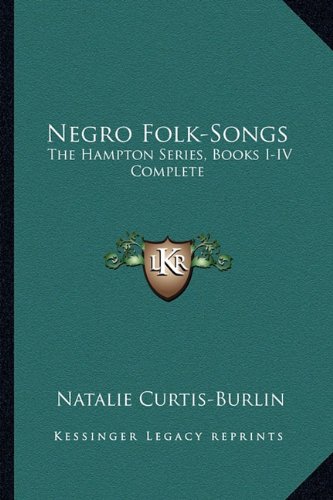
(This scarce antiquarian book is a facsimile reprint of th...)
This scarce antiquarian book is a facsimile reprint of the original. Due to its age, it may contain imperfections such as marks, notations, marginalia and flawed pages. Because we believe this work is culturally important, we have made it available as part of our commitment for protecting, preserving, and promoting the world's literature in affordable, high quality, modern editions that are true to the original work.
https://www.amazon.com/Negro-Folk-Songs-Hampton-Books-Complete/dp/1162979593?SubscriptionId=AKIAJRRWTH346WSPOAFQ&tag=prabook-20&linkCode=sp1&camp=2025&creative=165953&creativeASIN=1162979593
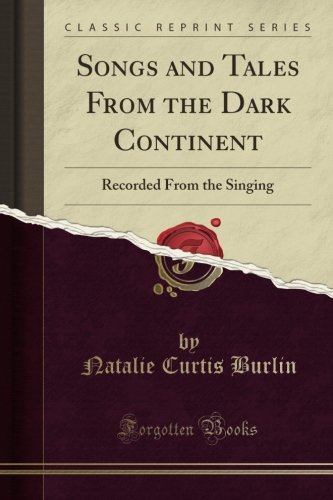
(Excerpt from Songs and Tales From the Dark Continent: Rec...)
Excerpt from Songs and Tales From the Dark Continent: Recorded From the Singing Note. - Ba'ntu African words are usually accented on the penultima, or syllable before the last. The future of the black African, whether on the Dark Continent or in the Americas, is to-day sharply silhouetted against that red which still burns in the sky although the fires or war are quenched. How much colonial expansion in Africa and the desire for it may have contributed to the deep underlying causes of the world-war, one fact is certain: the African, who had seen his land wrested from him by wealth-seeking European ambition, was summoned to stand shoulder to shoulder with the white man in the white man's country helping him to fight his battles. And no one questioned his loyalty. The war has taught the white man that he needs the black as the black man needs the white. For neither in their struggle nor in their advance can races to-day be independent of each other. Though the quest for power, for dominion, for economic supremacy which meant the oppression and exploitation of simpler, weaker peoples, recoiled with tragic fatality upon the white race itself - a boomerang, slaying the thrower - yet the war leaped beyond the white man and caught the darker races in its clutch. And though the grip was hideous and bloody, yet it linked the world together; and doubtless, when the dust shall clear, we shall find that men of diverse colors and creeds, men high and low, have been brought to know one another as never before. We Caucasians have known the black race for the most part from the outside only. We have thought of the natives of Africa and the Negroes in America chiefly as a labor supply. Though scholars have written of Africa and of its indigenous culture, history and folk-lore, the white man in general has known little of the soul of the black man. The African songs in this book and the various types of Negro songs in separate volumes of this same series have…
https://www.amazon.com/Songs-Tales-Dark-Continent-Recorded/dp/1330207149?SubscriptionId=AKIAJRRWTH346WSPOAFQ&tag=prabook-20&linkCode=sp1&camp=2025&creative=165953&creativeASIN=1330207149
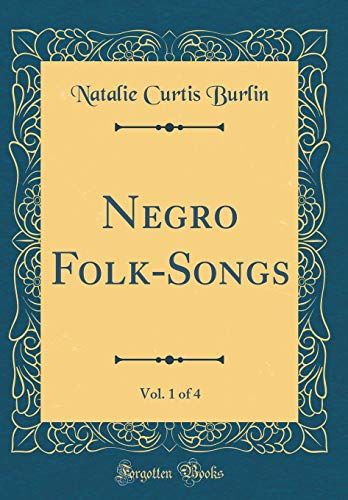
(Excerpt from Negro Folk-Songs, Vol. 1 of 4 Through leavi...)
Excerpt from Negro Folk-Songs, Vol. 1 of 4 Through leaving unspoiled this fresh, intuitive song-impulse in the Negro, and through cherishing the old music in its original purity and simplicity, Hampton has glorified the song of the slave as it has dignified the manual labor of the freedman, and is preserving in living form that spontaneous musical utterance which is the Negro's priceless contribution to the art of America. Negro dialect is used in these notations, for to sing these typical Negro songs in words from which have been expunged the racial and picturesque quality seems as colorless, inartistic and unnatural as to sing Scotch or Irish ballads in anything but the vernacular, or German and French folk-songs in other than their own quaint and simple verse. About the Publisher Forgotten Books publishes hundreds of thousands of rare and classic books. Find more at www.forgottenbooks.com This book is a reproduction of an important historical work. Forgotten Books uses state-of-the-art technology to digitally reconstruct the work, preserving the original format whilst repairing imperfections present in the aged copy. In rare cases, an imperfection in the original, such as a blemish or missing page, may be replicated in our edition. We do, however, repair the vast majority of imperfections successfully; any imperfections that remain are intentionally left to preserve the state of such historical works.
https://www.amazon.com/Negro-Folk-Songs-Vol-Classic-Reprint/dp/0266546668?SubscriptionId=AKIAJRRWTH346WSPOAFQ&tag=prabook-20&linkCode=sp1&camp=2025&creative=165953&creativeASIN=0266546668
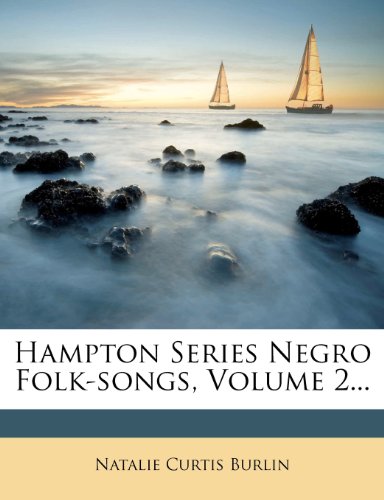
(This is a reproduction of a book published before 1923. T...)
This is a reproduction of a book published before 1923. This book may have occasional imperfections such as missing or blurred pages, poor pictures, errant marks, etc. that were either part of the original artifact, or were introduced by the scanning process. We believe this work is culturally important, and despite the imperfections, have elected to bring it back into print as part of our continuing commitment to the preservation of printed works worldwide. We appreciate your understanding of the imperfections in the preservation process, and hope you enjoy this valuable book. ++++ The below data was compiled from various identification fields in the bibliographic record of this title. This data is provided as an additional tool in helping to ensure edition identification: ++++ Hampton Series Negro Folk-songs, Volume 2; Hampton Series Negro Folk-songs; Natalie Curtis Burlin Natalie Curtis Burlin G. Schirmer, 1918 Music; Genres & Styles; Folk & Traditional; African Americans; Folk songs, English; Music / Genres & Styles / Folk & Traditional; Social Science / Ethnic Studies / African American Studies
https://www.amazon.com/Hampton-Folk-songs-Natalie-Curtis-Burlin/dp/127366695X?SubscriptionId=AKIAJRRWTH346WSPOAFQ&tag=prabook-20&linkCode=sp1&camp=2025&creative=165953&creativeASIN=127366695X
Natalie Curtis Burlin was born on April 26, 1875 in New York City, the daughter of Edward and Augusta Lawler (Stacey) Curtis and niece of George William Curtis.
Natalie first studied in the National Conservatory of Music, New York, with Arthur Friedheim; later, in Europe, with Busoni at Berlin, Giraudet in Paris, Wolf in Bonn, and Julius Kniese at the "Wagner-Schule" in Baireuth.
The first tangible result of her studies came in the form of The Indians' Book (1907), a collection of two hundred songs gathered from eighteen different tribes of North American Indians, mostly those of the Southwest, the Plains and the Pueblo tribes. As indicative of her deep and genuine interest in her subject and her ability to communicate this interest to others, it may be noted that when she began her studies the Indians were not allowed to sing their native songs in the government schools and that her earnest appeal to Theodore Roosevelt, then president, had the effect not only of revoking this rule, but also of giving the Indians every encouragement in the performance of their own music.
The publication of The Indians' Book aroused so much enthusiasm that an urgent request came that she should do for the negro music what she had so successfully accomplished for the Indian. This request resulted in her making at Hampton Institute a thorough study of negro songs.
In 1918-19 she published four volumes of Hampton Series Negro Folk-Songs for male quartet, retaining the instinctive harmonization of the singers themselves with no retouching on her part. This artistic restraint naturally gives to these volumes great historical value.
She obtained the material for her last published book, Songs and Tales from the Dark Continent (1920) from two native-born African students at Hampton Institute who gave her freely of the songs and stories of their native land.
In 1921 she died as the result of an automobile accident in Paris.
Natalie Curtis Burlin began collecting and transcribing African American music from 1910, and by 1918 she already published her "Negro Folk-Songs", a four volume work of spirituals and other songs. She was also vigorously participating in her study of the music of African tribes and in 1920 published "Songs and Tales from the Dark Continent. " One of her graetest achievements was when she aided David Mannes in organizing the Music School Settlement for Colored People in New York City, and she also helped arrange for the first concert of African-American music by African-American performers at Carnegie Hall in March 1914. In addition to the works noted above she published, Songs of Ancient America (1905), Songs from A Child's Garden of Verses by Robert Louis Stevenson (Wa-Wan Press), and various other songs and choruses. A new edition of The Indians' Book, with added material and new drawings made by Indians especially for the purpose, was issued in 1923.
(TOC Follows Negro Folk-Songs / Spirituals and Work/Play S...)
( This collection of Negro folk songs represents a faithf...)
(This book was originally published prior to 1923, and rep...)
(The Shelf2Life Native American Studies Collection is a un...)
( This work has been selected by scholars as being cultur...)
( This work has been selected by scholars as being cultur...)
(Excerpt from Songs and Tales From the Dark Continent: Rec...)
(By Hiamovi (H igh Chief) (C hief among the Cheyennes and ...)
(This scarce antiquarian book is a facsimile reprint of th...)
(This scarce antiquarian book is a facsimile reprint of th...)
(This historic book may have numerous typos and missing te...)
(This is a reproduction of a book published before 1923. T...)
(This is a reproduction of a book published before 1923. T...)
(Excerpt from Negro Folk-Songs, Vol. 3 of 4: Books I-II, S...)
(Excerpt from Negro Folk-Songs, Vol. 1 of 4 Through leavi...)
On returning to America it was evidently her purpose to continue her career as pianist, but while visiting her brother in Arizona she became so much interested in the Indians of that region and in their music that she visited many different encampments, taking down their songs by word of mouth. From that time on, her great interest lay in this sort of research. After a 1900 trip in which she visited Arizona's Hopi Indian reservation, she decided to devote herself to collecting and preserving Native American music.
For all of her care and concern for the peoples she studied and whose rights she promoted, Burlin's views, seen with the clarity of historical distance, seem condescending. She referred to the Native Americans as "simple people" and "children of the desert" and portrayed their culture in an unrealistic and idealized light. Her views of African Americans could be considered patronizing: "The Negroes possess an intuitive gift for part-singing, " she noted in the foreword to Book I. "This instinct, transplanted to America and influenced by European music, has flowered into the truly extraordinary harmonic talent found in the singing of even the most ignorant Negroes of our Southern States. " It "makes one wonder at the possibilities of the race, " she mused in Book IV.
Quotations:
Characterizing her own task as a transcriber, she wrote, “I have in nowise changed the melodies, nor have I sought to harmonize them in the usual sense, nor to make of them musical compositions…My one desire has been to let the Indian songs be heard as the Indians themselves sing them. .. "
Her views of African Americans could be considered patronizing: "The Negroes possess an intuitive gift for part-singing, " she noted in the foreword to Book I. "This instinct, transplanted to America and influenced by European music, has flowered into the truly extraordinary harmonic talent found in the singing of even the most ignorant Negroes of our Southern States. "
Speaking to the Congress of Art History, she railed against "the everlasting monopoly of the white race, " and praised the "12 million Negroes who are 'good enough' Americans to die for American ideals in our wars. " She defended America's multicultural heritage, saying, "All America is not New England, but an agglomeration of races with a rich and diverse folklore. "
Quotes from others about the person
Percy Grainger, in the New York Times, April 14, 1918, said: "When I peruse these her strangely perfect and satisfying recordings of these superb American negro part songs, I cannot refrain from exclaiming, How lucky she to have found such noble material, and it such an inspired transcriber!"
She had been married in 1917 to Paul Burlin, painter, of New York.
1838–191
1841–1934
1869–1959
1876–1952
1870–1966
1886–1969 (m. 1917)
President Among her friends was President Theodore Roosevelt, who visited the reservation with her in 1913.
